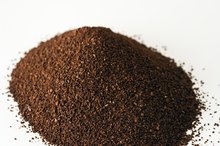What does fact checked mean?
At Healthfully, we strive to deliver objective content that is accurate and up-to-date. Our team periodically reviews articles in order to ensure content quality. The sources cited below consist of evidence from peer-reviewed journals, prominent medical organizations, academic associations, and government data.
- Mayo Clinic; Enlarged Prostate — Does Diet Play a Role?; Jennifer Nelson, et al.; January 2010
- Mayo Clinic; Prostate Gland Enlargement; December 2009
The information contained on this site is for informational purposes only, and should not be used as a substitute for the advice of a professional health care provider. Please check with the appropriate physician regarding health questions and concerns. Although we strive to deliver accurate and up-to-date information, no guarantee to that effect is made.
Does Coffee Cause an Enlarged Prostate?
By age 60, an estimated 50 percent of men will develop an enlarged prostate — a condition that may gradually impact bladder function and interfere with your ability to urinate, according to the Mayo Clinic. While the exact cause of the condition is unknown, conflicting scientific research suggests coffee consumption may affect your risk of developing an enlarged prostate.
If you are experiencing serious medical symptoms, seek emergency treatment immediately.
Benign Prostatic Hyperplasia
Benign prostatic hyperplasia, or an enlarged prostate, is a condition in men that causes uncomfortable urinary tract and bladder problems when the prostate gland expands. Located under your bladder, your prostate naturally grows with age and can press against the urethra, a tube that runs from the bladder through the prostate and penis, carrying urine out of your body. This can make it hard to urinate and may reduce the flow and force of your urine. Symptoms of the condition, known as BPH, include:
- frequent urination
- particularly at night; difficulty beginning to urinate
- dribbling after urination is complete
- inability to urinate or completely empty your bladder
- blood or pain during urination
- a weak urine flow
Medication, surgery and lifestyle and dietary changes can help alleviate symptoms and treat the condition.
- Benign prostatic hyperplasia, or an enlarged prostate, is a condition in men that causes uncomfortable urinary tract and bladder problems when the prostate gland expands.
- Symptoms of the condition, known as BPH, include: * frequent urination
* particularly at night; difficulty beginning to urinate
* dribbling after urination is complete
* inability to urinate or completely empty your bladder
* blood or pain during urination
* a weak urine flow Medication, surgery and lifestyle and dietary changes can help alleviate symptoms and treat the condition.
The Role of Coffee
How to Shrink the Prostate Naturally
Learn More
Coffee is a caffeinated beverage that can aggravate symptoms of an enlarged prostate. While caffeine is well known for its ability to stimulate the nervous system to help keep you alert, it is also a diuretic. A diuretic increases urine production by the kidneys and helps eliminate fluid from your body. In men who have an enlarged prostate and an already irritated or obstructed bladder, this can worsen symptoms by boosting urination frequency and the sudden and intense need to urinate, John Hopkins Medicine notes.
- Coffee is a caffeinated beverage that can aggravate symptoms of an enlarged prostate.
- In men who have an enlarged prostate and an already irritated or obstructed bladder, this can worsen symptoms by boosting urination frequency and the sudden and intense need to urinate, John Hopkins Medicine notes.
Coffee and BPH Risk
Scientific studies examining the link between coffee consumption and the risk of an enlarged prostate have found no clear association. An early study in the May 1992 edition of the “American Journal of Epidemiology” reported study participants who consumed four or more cups of coffee per day had a lower risk of developing the condition compared to those who consumed less than one cup; however, a study by R. Gass in the November 2002 issue of “BJU International” found an increase in coffee consumption significantly increased the risk of an enlarged prostate 23. In the study, Gass theorized coffee increases blood levels of low-density lipoprotein, or LDL, which may be involved in the development of the disease.
Considerations
Do Coffee and Caffeine Cause Kidney Stones?
Learn More
While the impact of coffee intake on the risk of BPH is uncertain, research in the January 2006 issue of “Urology” suggests other dietary habits may also play a role. According to authors Francesca Bravi and colleagues, study participants who frequently consumed cereals and poultry but not enough vegetables and pulses had a greater likelihood of developing an enlarged prostate. Further study is necessary to validate the study’s findings.
- While the impact of coffee intake on the risk of BPH is uncertain, research in the January 2006 issue of “Urology” suggests other dietary habits may also play a role.
- According to authors Francesca Bravi and colleagues, study participants who frequently consumed cereals and poultry but not enough vegetables and pulses had a greater likelihood of developing an enlarged prostate.
Related Articles
References
- Mayo Clinic; Enlarged Prostate — Does Diet Play a Role?; Jennifer Nelson, et al.; January 2010
- “American Journal of Epidemiology”; Risk Factors For Surgery For Prostatic Hypertrophy; Alan S. Morrison; May 1992
- “BJU International”; Benign Prostatic Hyperplasia — The Opposite Effects of Alcohol and Coffee Intake; R. Gass; November 2002
- “Urology”; Food Groups and Risk of Benign Prostatic Hyperplasia; Francesca Bravi, et al.; January 2006
- Mayo Clinic; Prostate Gland Enlargement; December 2009
- Lee CL, Kuo HC. Pathophysiology of benign prostate enlargement and lower urinary tract symptoms: Current concepts. Ci Ji Yi Xue Za Zhi. 2017;29(2):79–83. doi:10.4103/tcmj.tcmj_20_17
- Grozescu T, Popa F. Prostate cancer between prognosis and adequate/proper therapy. J Med Life. 2017;10(1):5–12. PMID: 28255369
- Benign enlarged prostate: Overview. InformedHealth.org [Internet]. Published January 25, 2018.
- Weiss JP. Nocturia: focus on etiology and consequences. Rev Urol. 2012;14(3-4):48–55. PMID: 23526404
- Serlin DC, Heidelbaugh JJ, Stoffel JT. Urinary Retention in Adults: Evaluation and Initial Management. Am Fam Physician. 2018;98(8):496-503. PMID: 30277739
- Rowe TA, Juthani-Mehta M. Urinary tract infection in older adults. Aging health. 2013;9(5):10.2217/ahe.13.38. doi:10.2217/ahe.13.38
- Rodgers M, Nixon J, Hempel S, et al. Diagnostic tests and algorithms used in the investigation of haematuria: systematic reviews and economic evaluation. Health Technol Assess. 2006;10(18):iii-iv, xi-259. doi:10.3310/hta10180
- Liu TT, Thomas S, Mclean DT, et al. Prostate enlargement and altered urinary function are part of the aging process. Aging (Albany NY). 2019;11(9):2653–2669. doi:10.18632/aging.101938
- Roehrborn CG. Benign prostatic hyperplasia: an overview. Rev Urol. 2005;7 Suppl 9(Suppl 9):S3–S14. PMID: 16985902
- Prostate Enlargement (Benign Prostatic Hyperplasia). National Institute of Diabetes and Digestive and Kidney Diseases. Published September 1, 2014.
- Pontari MA, Ruggieri MR. Mechanisms in prostatitis/chronic pelvic pain syndrome. J Urol. 2004;172(3):839–845. doi:10.1097/01.ju.0000136002.76898.04
- Litwin MS, Tan HJ. The Diagnosis and Treatment of Prostate Cancer: A Review. JAMA. 2017;317(24):2532-2542. doi:10.1001/jama.2017.7248
- Mandaliya H, Sung J, Hill J, Samali R, George M. Prostate Cancer: Cases of Rare Presentation and Rare Metastasis. Case Rep Oncol. 2015;8(3):526–529. Published 2015 Nov 26. doi:10.1159/000442045
- Palmerola R, Smith P, Elliot V, et al. The digital rectal examination (DRE) remains important - outcomes from a contemporary cohort of men undergoing an initial 12-18 core prostate needle biopsy. Can J Urol. 2012;19(6):6542-7. PMID: 23228289
- Chang RT, Kirby R, Challacombe BJ. Is there a link between BPH and prostate cancer?. Practitioner. 2012;256(1750):13-6, 2. PMID: 22792684
- De Angelis G, Rittenhouse HG, Mikolajczyk SD, Blair Shamel L, Semjonow A. Twenty Years of PSA: From Prostate Antigen to Tumor Marker. Rev Urol. 2007;9(3):113–123. PMID: 17934568
- Prostate cancer: Overview. InformedHealth.org [Internet]. Published February 22, 2018.
- Yu Y, Sikorski P, Bowman-Gholston C, Cacciabeve N, Nelson KE, Pieper R. Diagnosing inflammation and infection in the urinary system via proteomics. J Transl Med. 2015;13:111. Published 2015 Apr 8. doi:10.1186/s12967-015-0475-3
- James LJ, Wong G, Craig JC, et al. Men's perspectives of prostate cancer screening: A systematic review of qualitative studies. PLoS One. 2017;12(11):e0188258. Published 2017 Nov 28. doi:10.1371/journal.pone.0188258
- Feneley RC, Hopley IB, Wells PN. Urinary catheters: history, current status, adverse events and research agenda [published correction appears in J Med Eng Technol. 2016;40(2):59]. J Med Eng Technol. 2015;39(8):459–470. doi:10.3109/03091902.2015.1085600
- Colli E, Artibani W, Goka J, Parazzini F, Wein AJ. Are urodynamic tests useful tools for the initial conservative management of non-neurogenic urinary incontinence? A review of the literature. Eur Urol. 2003;43(1):63-9. doi:10.1016/s0302-2838(02)00494-3
- May M, Brookman-amissah S, Hoschke B, Gilfrich C, Braun KP, Kendel F. Post-void residual urine as a predictor of urinary tract infection--is there a cutoff value in asymptomatic men?. J Urol. 2009;181(6):2540-4. doi:10.1016/j.juro.2009.01.103
- Turkbey B, Pinto PA, Choyke PL. Imaging techniques for prostate cancer: implications for focal therapy. Nat Rev Urol. 2009;6(4):191–203. doi:10.1038/nrurol.2009.27
- Demaagd GA, Davenport TC. Management of urinary incontinence. P T. 2012;37(6):345–361H. PMID: 22876096
- Hall SA, Yang M, Gates MA, Steers WD, Tennstedt SL, McKinlay JB. Associations of commonly used medications with urinary incontinence in a community based sample. J Urol. 2012;188(1):183–189. doi:10.1016/j.juro.2012.02.2575
- Nickel JC. Comparison of trials with finasteride and dutasteride. Rev Urol. 2004;6 Suppl 9(Suppl 9):S31–S39. PMID: 16985923
- Chapple CR. A Comparison of Varying alpha-Blockers and Other Pharmacotherapy Options for Lower Urinary Tract Symptoms. Rev Urol. 2005;7 Suppl 4(Suppl 4):S22–S30. PMID: 16986051
- Lipsky BA, Byren I, Hoey CT. Treatment of bacterial prostatitis. Clin Infect Dis. 2010;50(12):1641-52. doi:10.1086/652861
- Welliver C, Helo S, McVary KT. Technique considerations and complication management in transurethral resection of the prostate and photoselective vaporization of the prostate. Transl Androl Urol. 2017;6(4):695–703. doi:10.21037/tau.2017.07.30
- Li M, Qiu J, Hou Q, et al. Endoscopic enucleation versus open prostatectomy for treating large benign prostatic hyperplasia: a meta-analysis of randomized controlled trials. PLoS One. 2015;10(3):e0121265. Published 2015 Mar 31. doi:10.1371/journal.pone.0121265
- Lorenzo G, Hughes TJR, Dominguez-Frojan P, Reali A, Gomez H. Computer simulations suggest that prostate enlargement due to benign prostatic hyperplasia mechanically impedes prostate cancer growth. Proc Natl Acad Sci U S A. 2019 Jan 22;116(4):1152-1161. Published Jan 2019. doi:10.1073/pnas.1815735116
Resources
Writer Bio
Julie Saccone is a senior communications specialist and former journalist who began writing in 2003. She works in the health-care industry distilling research findings and complex medical topics for media and trade publications. Saccone has been published in newspapers including the "National Post" and "StarPhoenix." She holds a Bachelor of Arts in journalism from Ryerson University and an honors Bachelor of Science.








